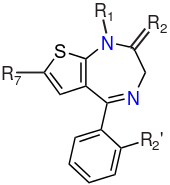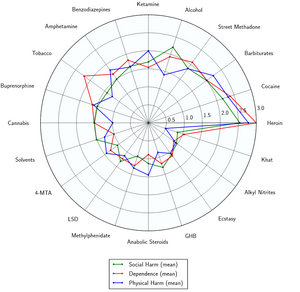Thienodiazepines: Difference between revisions
>Josikins No edit summary |
>Josikins No edit summary |
||
| Line 9: | Line 9: | ||
*[[Bentazepam]] | *[[Bentazepam]] | ||
Since thienodiazepines interact with the [[benzodiazepine]] receptor site, they typically have similar effects as benzodiazepines. | Since thienodiazepines interact with the [[benzodiazepine]] receptor site, they typically have similar effects as benzodiazepines and can be considered as essentially identical. | ||
==Toxicity and harm potential== | |||
[[File:harmchart.png|thumb|right|300px|Radar plot showing relative physical harm, social harm, and dependence of benzodiazepines in comparison to other drugs.<ref>Development of a rational scale to assess the harm of drugs of potential misuse | http://www.sciencedirect.com/science/article/pii/S0140673607604644</ref>]] | |||
===Lethal dosage=== | |||
The median lethal dosage varies wildly between specific substances within the thienzodiazepine class. It is because of this that one should always fully research the substance before administering it to themselves or others. | |||
===Tolerance and addiction potential=== | |||
Tolerance will develop to the sedative-hypnotic effects within a couple of days.<ref>Principles and Practice of Psychopharmacotherapy | http://books.google.com/books?id=_ePK9wwcQUMC&pg=PA535</ref> Withdrawal symptoms or rebound symptoms may occur after ceasing treatment abruptly following a few weeks or longer of steady dosing, and may necessitate a gradual dose reduction.<ref>Clinical Pharmacology, Clinical Efficacy, and Behavioral Toxicity of Alprazolam: A Review of the Literature | http://onlinelibrary.wiley.com/doi/10.1111/j.1527-3458.2004.tb00003.x/pdf</ref> <ref>The American Psychiatric Publishing Textbook of Substance Abuse Treatment | http://books.google.com/books?id=6wdJgejlQzYC&pg=PA222&hl=en#v=onepage&q&f=false</ref> | |||
====Discontinuation==== | |||
It is notoriously difficult to discontinue use of thienodiazepine, and potentially life threatening for tolerant individuals using regularly to do so without tapering their dose over a period of weeks. Thienodiazepine are positive allosteric modulators of [[GABA]] [[receptors]], so as the brain is calibrated to operate with higher than usual inhibition, the number of GABA receptors expressed is reduced via downregulation. Abrupt discontinuation following chronic use of benzodiazepines causes rebound stimulation which presents as [[anxiety]], [[wakefulness|insomnia]] and restlessness while the body attempts to return to homeostasis. | |||
There is an increased risk of seizure following discontinuation of thienodiazepine. Drugs which lower the seizure threshold such as [[tramadol]] should be avoided during withdrawal. It is safest to reduce the dose each day by a very small amount, for a couple of weeks until close to abstinence. Small amounts of [[ethanol]] can also help to reduce the symptoms. | |||
Duration and severity of symptoms depends on a number of factors including the half life of the drug used, tolerance and the duration of abuse. Major symptoms will usually start within just a few days after discontinuation and persist for around a week for shorter lasting thienodiazepine. Thienodiazepine with longer half-lives will exhibit discontinuation symptoms with a slow onset and extended duration. | |||
===See also=== | ===See also=== | ||
| Line 15: | Line 28: | ||
*[[Benzodiazepine]] | *[[Benzodiazepine]] | ||
*[[GABA]] | *[[GABA]] | ||
===References=== | |||
<references/> | |||
Revision as of 17:09, 9 November 2014
 |
This article is a stub. As such, it may contain incomplete or wrong information. You can help by expanding it. |

A thienodiazepine is a heterocyclic compound containing a diazepine ring fused to a thiophene ring. Thienodiazepine forms the central core of several pharmaceutical drugs including:
Since thienodiazepines interact with the benzodiazepine receptor site, they typically have similar effects as benzodiazepines and can be considered as essentially identical.
Toxicity and harm potential

Lethal dosage
The median lethal dosage varies wildly between specific substances within the thienzodiazepine class. It is because of this that one should always fully research the substance before administering it to themselves or others.
Tolerance and addiction potential
Tolerance will develop to the sedative-hypnotic effects within a couple of days.[2] Withdrawal symptoms or rebound symptoms may occur after ceasing treatment abruptly following a few weeks or longer of steady dosing, and may necessitate a gradual dose reduction.[3] [4]
Discontinuation
It is notoriously difficult to discontinue use of thienodiazepine, and potentially life threatening for tolerant individuals using regularly to do so without tapering their dose over a period of weeks. Thienodiazepine are positive allosteric modulators of GABA receptors, so as the brain is calibrated to operate with higher than usual inhibition, the number of GABA receptors expressed is reduced via downregulation. Abrupt discontinuation following chronic use of benzodiazepines causes rebound stimulation which presents as anxiety, insomnia and restlessness while the body attempts to return to homeostasis.
There is an increased risk of seizure following discontinuation of thienodiazepine. Drugs which lower the seizure threshold such as tramadol should be avoided during withdrawal. It is safest to reduce the dose each day by a very small amount, for a couple of weeks until close to abstinence. Small amounts of ethanol can also help to reduce the symptoms.
Duration and severity of symptoms depends on a number of factors including the half life of the drug used, tolerance and the duration of abuse. Major symptoms will usually start within just a few days after discontinuation and persist for around a week for shorter lasting thienodiazepine. Thienodiazepine with longer half-lives will exhibit discontinuation symptoms with a slow onset and extended duration.
See also
References
- ↑ Development of a rational scale to assess the harm of drugs of potential misuse | http://www.sciencedirect.com/science/article/pii/S0140673607604644
- ↑ Principles and Practice of Psychopharmacotherapy | http://books.google.com/books?id=_ePK9wwcQUMC&pg=PA535
- ↑ Clinical Pharmacology, Clinical Efficacy, and Behavioral Toxicity of Alprazolam: A Review of the Literature | http://onlinelibrary.wiley.com/doi/10.1111/j.1527-3458.2004.tb00003.x/pdf
- ↑ The American Psychiatric Publishing Textbook of Substance Abuse Treatment | http://books.google.com/books?id=6wdJgejlQzYC&pg=PA222&hl=en#v=onepage&q&f=false